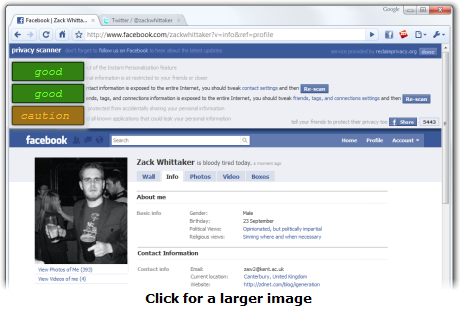The non-invasive privacy scanner Facebook should have implemented

A former student of the University of Michigan and an avid JavaScript developer has created a tool which allows you to 'reclaim your Facebook privacy'. Through simply logging into Facebook and pasting the long line of JavaScript into your browser's address bar, it will regurgitate your Facebook privacy settings on a DEFCON-like scale.
It examines how much of your personal data is available to 'everyone' - including those not eve logged into the site. If it detects as such, it flags it up for you and provides feedback on where you are going wrong. In some cases, it can fix it for you.
Because it uses JavaScript, it's client side only code; meaning the developer never sees your Facebook data as it is all within your browser. You don't have to accept any suspicious applications or 'like' a particular page; you just paste in the code and it tells you where you are going wrong.
It can be useful to have some information available to 'everyone'. In my case, you can see my email address which allows anybody and everybody to contact me if they wish. This could lead to issues, I know, but provided as you are clear and aware of what information you have open to the public, it keeps the noose tightly around the neck of the privacy monster.
This little 'tool' shows two stark things. One, that developers out there still have plenty of good intention left in them, but that tools such as this are still difficult to trust with the climate we are living in. And secondly, Facebook should have implemented something like this long ago instead of relying on a third-party developer to create it on a spur of a moment thought.
As someone who has used it, I would strongly recommend using it and can vouch for its security and authenticity. You can access the tool here.
